Big Red Book
Celebrating television's This Is Your Life
C B FRY (1872-1956)
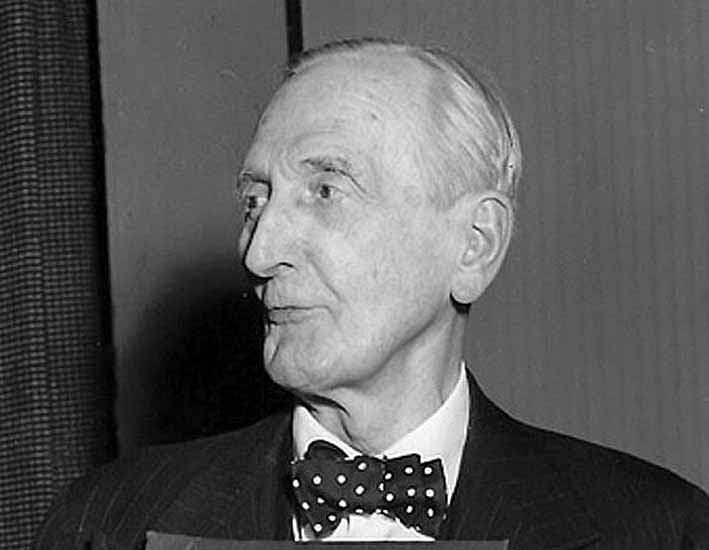
THIS IS YOUR LIFE - Charles Burgess Fry, sportsman, journalist, author and scholar, was surprised by Eamonn Andrews in the audience at the BBC Television Theatre, having been brought there by the sports writer Denzil Batchelor.
After attending Repton public school, CB won a scholarship to Oxford, where as well as being a brilliant scholar, he showed his potential to be the most outstanding all-round athlete of modern times. Following a successful career as a professional footballer, playing for Southampton in the FA Cup final, and time as a brilliant track and field athlete, equalling the world long jump record, CB turned to cricket, going on to captain both Sussex and England.
He was also a classical scholar who devoted 42 years of teaching to the famous Training Ship 'Mercury', had a distinguished career as an author and journalist, and worked for the cause of world peace in Geneva as a speechwriter for the Indian delegation at the League of Nations.
"I am much honoured. I was much struck by the amplitude and great skill of the programme"
programme details...
- Edition No: 5
- Subject No: 5
- Broadcast live: Sun 18 Dec 1955
- Broadcast time: 8.15-8.45pm
- Venue: BBC Television Theatre
- Series: 1
- Edition: 5
on the guest list...
- Jonathan - grandson
- William J Clarry
- Eric McGavin
- Dame Rachel Crowdy
- Lt Cdr Peter Varley
- Josephine Bradley
- Reg Sinfield
- Sydney Barnes
- Tiger Smith
- Sir Jack Hobbs
production team...
- Researchers: Peter Moore, Nigel Ward
- Writer: Gale Pedrick
- Director: unknown
- Producer: T Leslie Jackson
bowling up the cricketers
the programme's icon
This Is Your Life by Eamonn Andrews
Weekend Magazine reports from behind-the-scenes
Jonathan Fry, grandson of C B Fry, recalls his grandfather and this edition of This Is Your Life in an exclusive interview recorded in April 2012
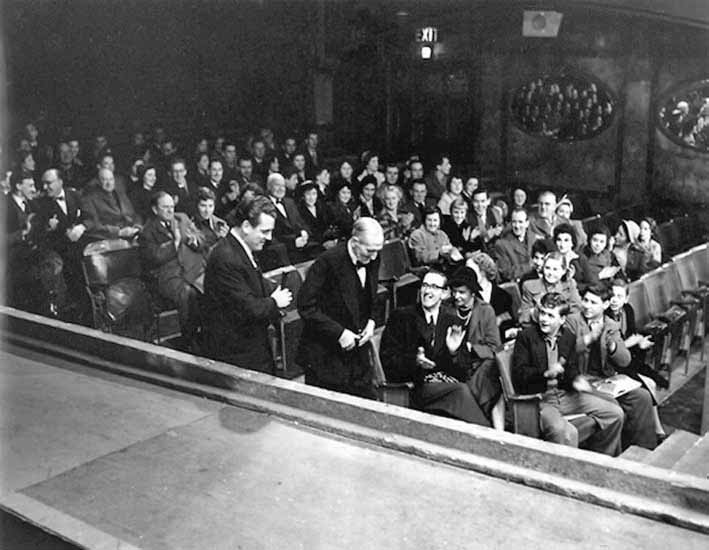
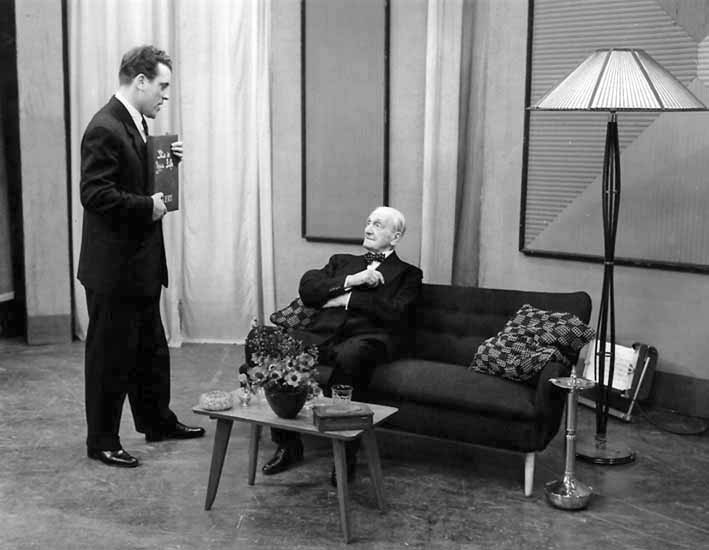
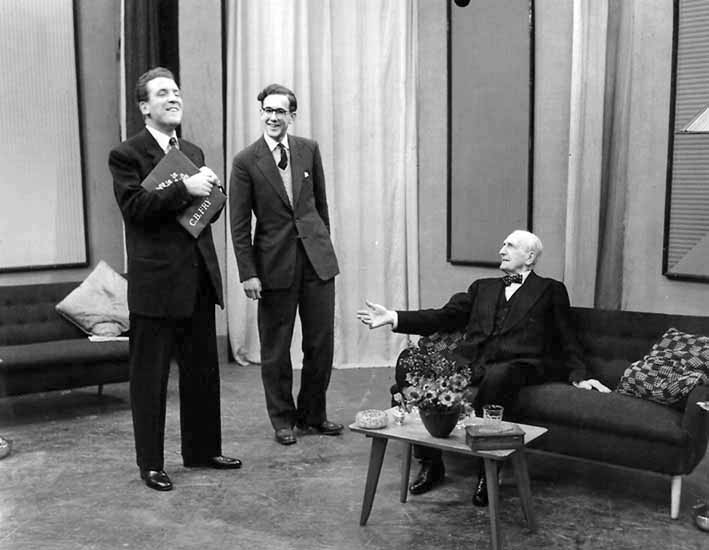
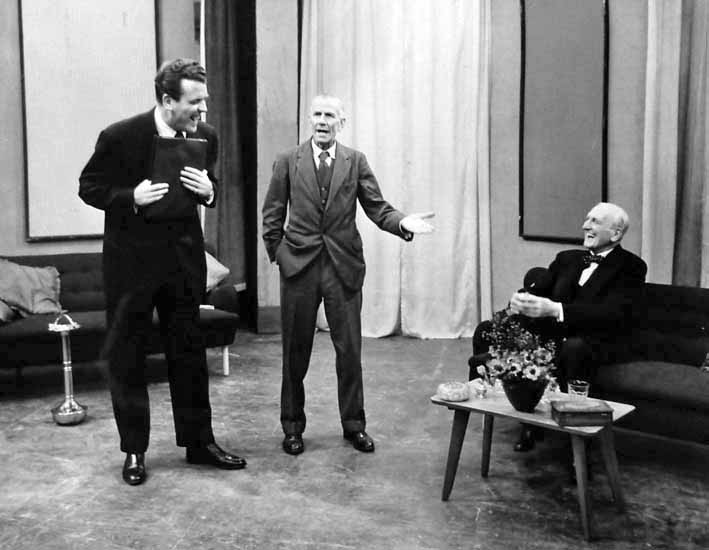
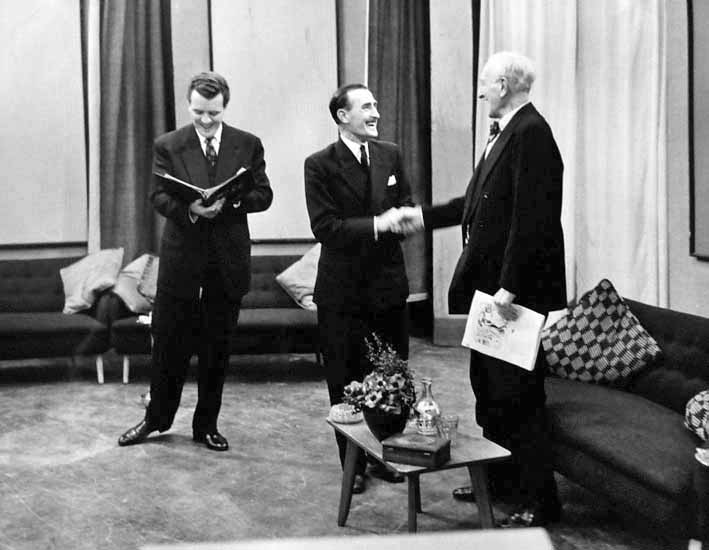
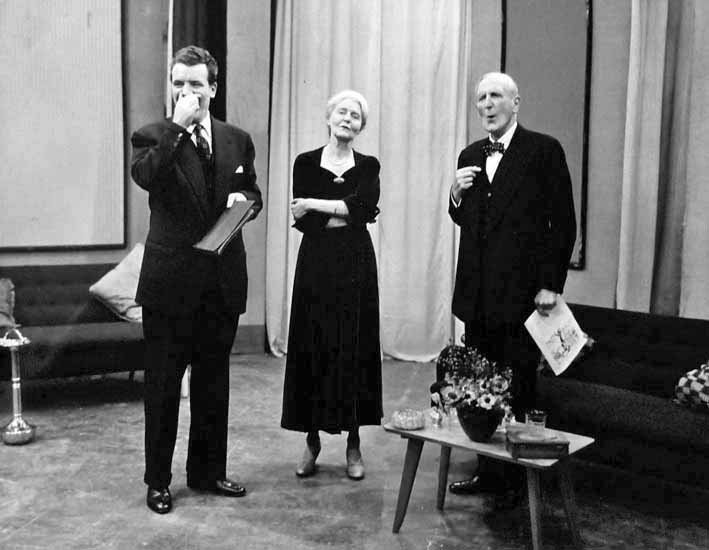
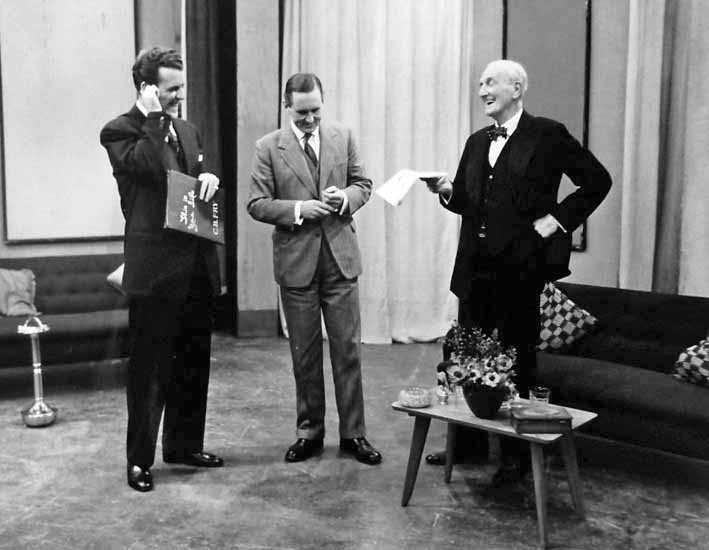
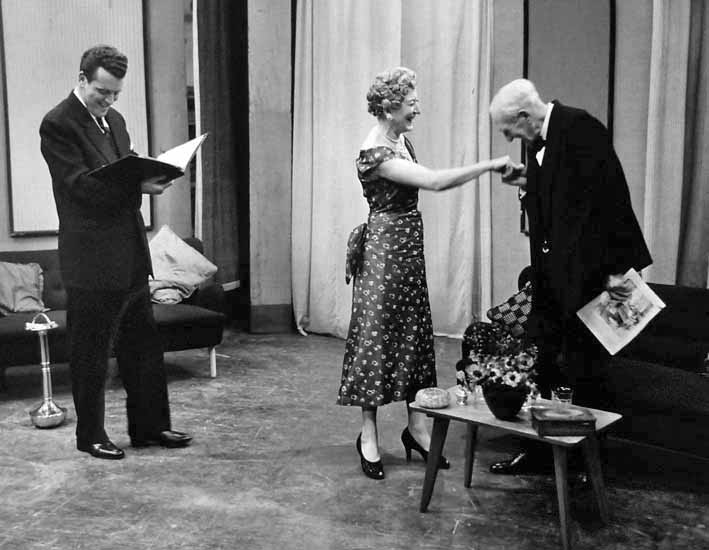
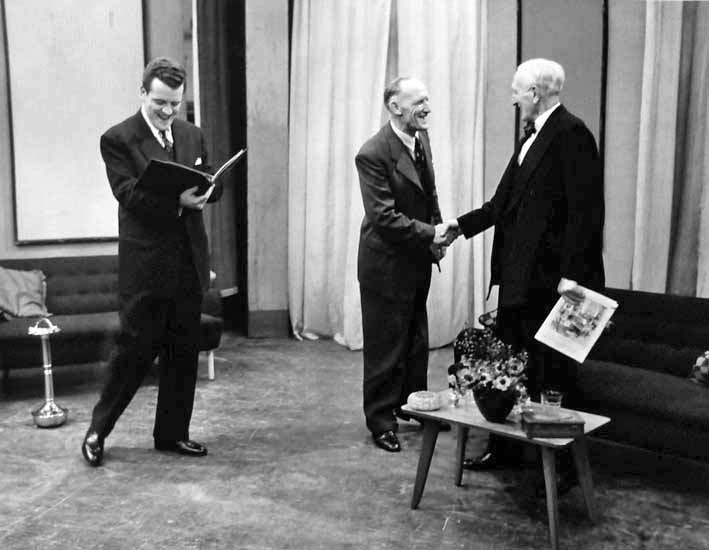
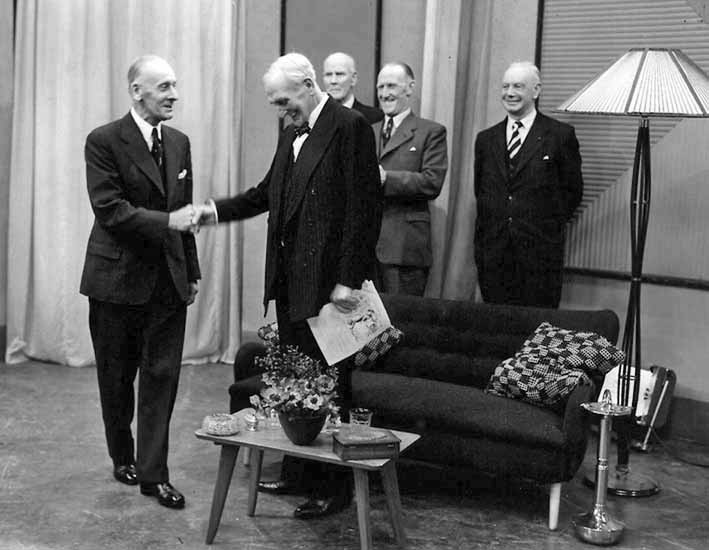
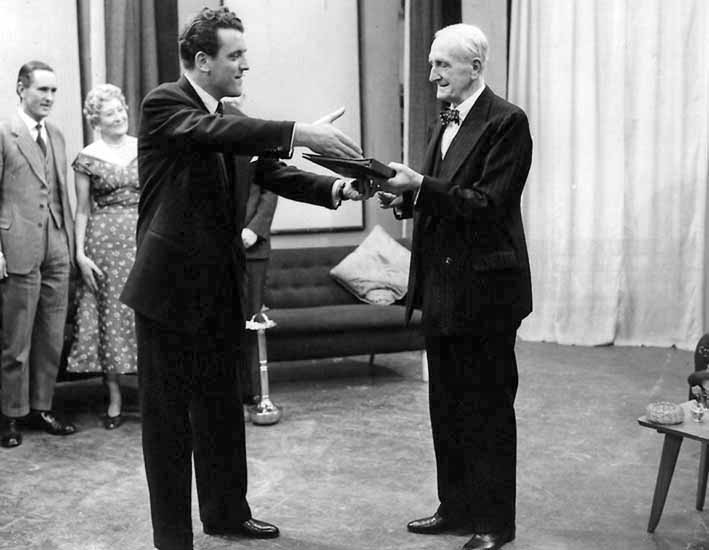
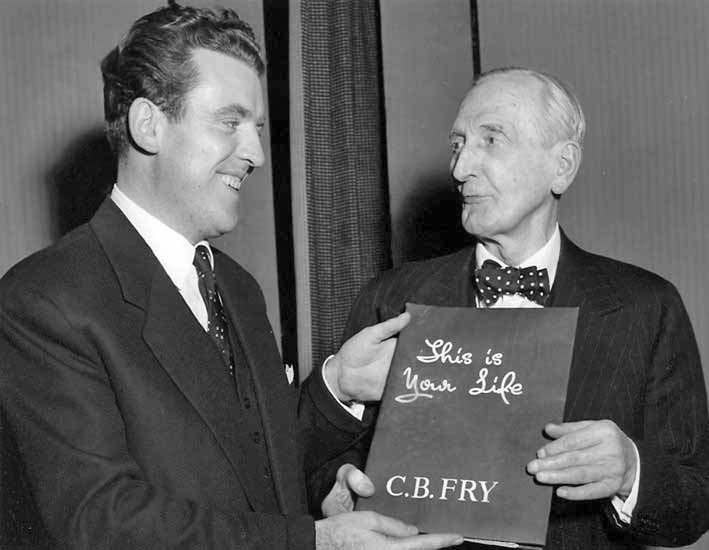
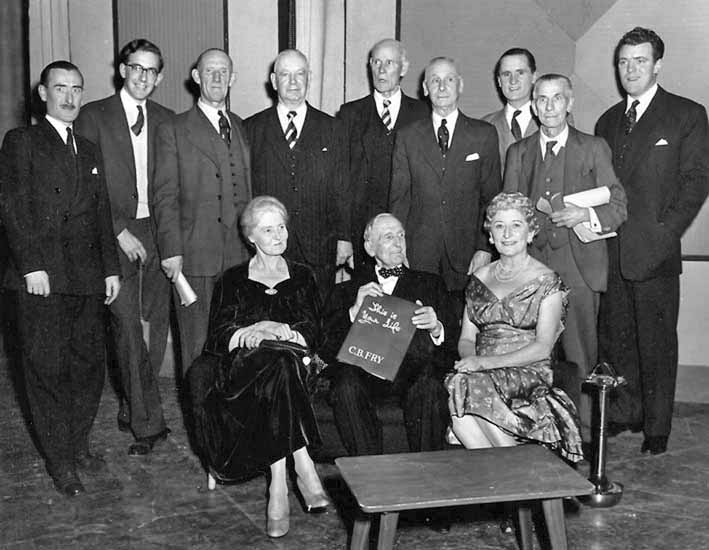
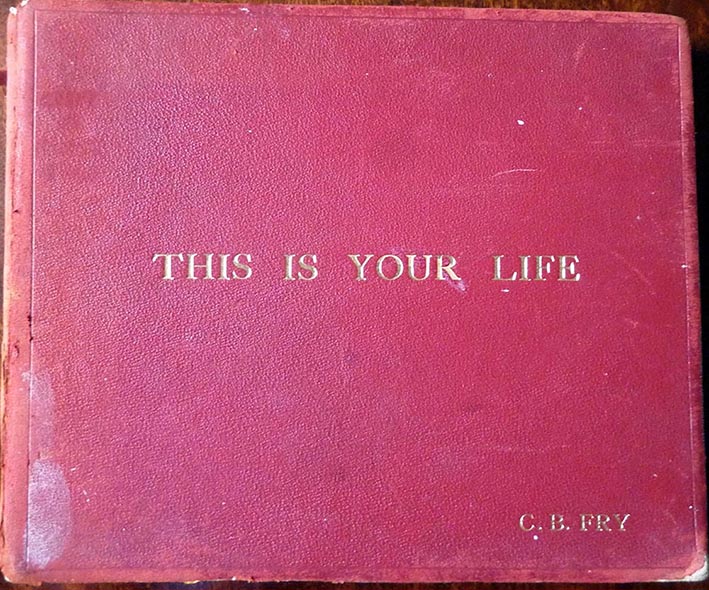
Photographs of C B Fry This Is Your Life - and a photograph of C B Fry's big red book
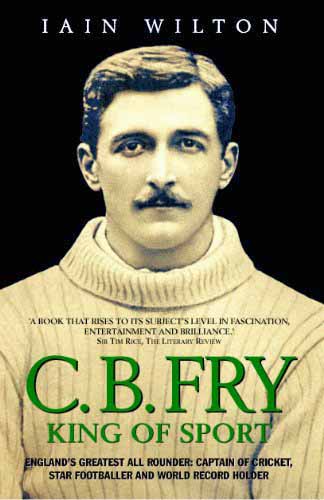
Two years later, the BBC gave CB another chance to look back on his life and, this time, he did so on television. On 18 December 1955, he arrived at the BBC Television Theatre, sat in the stalls and was surprised when the host plucked him out of the audience and asked him to appear on stage. As the host was Eamonn Andrews, and the programme was the newly launched This is Your Life, the surprise was a pleasant one – and the scene was set for Fry to re-live some of his finest moments and be reunited with many friends and former associates. Indeed, Faith, Stephen and Charis, as well as Denzil Batchelor, had been secretly working with the BBC's programme-makers to ensure that CB had a day to remember. Andrews's introduction reminded people of the remarkable life that Fry had led; 'Our guest tonight, ladies and gentlemen, is a brilliant classical scholar; he devoted 42 years of his life to the Training Ship Mercury; had a distinguished career as an author and journalist; and did devoted work in the cause of world peace at Geneva.' It was, Andrews continued, 'a unique and breath-taking record' – and he hadn't even mentioned Fry's sporting achievements. In fact, sport was not featured in the first part of the programme, which concentrated on CB's spells at Repton, Hamble and Geneva, plus his stint as a magazine editor in London's Southampton Street.
Appropriately, the first guest was CB's eldest grandson, Jonathan, who had not only followed in his footsteps by becoming a Reptonian but emulated his grandfather by proving to be an excellent classical scholar who won, like CB, both the Peile Prize for Greek prose and the Latham Prize for Classics.
The presence of the second guest, WJ Clarry, provided an equally poignant reminder of another aspect of CB's life – his long association with Fry's Magazine. Clarry had worked on the publication from the first edition to the last and had clearly been impressed by both the quality and quantity of CB's contributions – commenting that Fry had been 'a brilliant writer' who 'contributed hundreds of thousands of words a year.' He could also remember the extent of Fry's fame in the decade before the First World War. Within Britain, he said, CB was revered as 'The Admirable Crichton of Sport' – and he was famous on mainland Europe as well: 'His name was very well-known on the Continent. In fact, to them, there was only one British sportsman – CB Fry.'
After Clarry had reminded viewers about C.B.'s ten-year involvement in Fry's Magazine, Eric McGavin spoke about his links with Hamble, which had lasted even longer. Indeed, McGavin remarked that his own connection with C.B. had begun at a particularly early age: as he told Eamonn Andrews. 'We first met at the font' – because Fry had agreed to be his godfather.
While CB would have been pleased to see his eldest grandson, godson and former office-boy, he was probably delighted by the choice of the next guest. Introduced as 'the Commandant of the indispensable V.A.D.s of the First World War', Dame Rachel Crowdy arrived, looking as elegant as ever, and paid tribute to a friend and admirer of over thirty years' standing. She referred to his 'tremendous' contribution to the Mercury, his 'wonderful' work on Indian issues at Geneva and the outstanding quality of his dancing – although she added that he 'took such long and imperious strides that his partners found it very hard on stockings.' Asked to summarise Fry for the audience, she said that 'he has the very admirable trait of modest vanity' – and referred to 'the many lives which he [has] packed into one.'
Some of the same themes were mentioned by Josephine Bradley, who told Andrews how she had been struck by Fry's physical presence when he first arrived at her dancing school in 1934 – a meeting which had led to another friendship that was still going strong.
The remainder of the programme concentrated on the two subjects for which Fry was most famous – cricket and the Mercury. First, Peter Varley reflected on the school and the training which had enabled him to rise through the ranks in the Royal Navy. But while he praised CB's role, he stressed that 'a great deal of the spirit and inspiration we assimilated... was due to Mrs Fry.' It was not, he added, her only talent. Even in later life, she combined her interest in equestrianism – which had led, indirectly, to the Mercury's creation – with her determination to enforce discipline amongst the school's trainees. As Varley remembered: 'She was... a very fine horsewoman, and I remember once when we were forming fours – not too smartly, perhaps – she shouted to us, 'Don't push about there! A horse was disqualified for that yesterday!'
Similarly, Reg Sinfield recalled his time at Hamble – and one of the ways in which C.B. had maintained discipline – and helped to steer the programme away from Fry's sixty year association with the Mercury and towards his life-long interest in cricket. As both a Mercury old boy and a former Test cricketer, Sinfield ensured there was a smooth transition between the two – remembering how Fry had punished him for his mistakes in mathematics (by making him bowl in the Mercury nets) and revealing the advice that CB had given Charlie Barnett at Hamble shortly before the First Test in 1938.
Although Sinfield had played for England, he was not the most illustrious of the cricketers who appeared on the programme to pay homage to Fry, as CB was honoured by the presence of three former Test colleagues who rank as all-time England greats – an outstanding wicket-keeper ('Tiger' Smith), a brilliant bowler (Sydney Barnes) and the most prolific century-maker in cricket history (Sir Jack Hobbs). The programme maker's decision to invite Smith was perhaps an odd one, as he regarded Fry with respect rather than affection, but 'the fond reminiscing went on deep into the night' C.B. certainly seems to have enjoyed every aspect of his appearance on the programme (only the fifth This Is Your Life) – commenting that he felt 'much honoured' by the occasion.
Photographs taken by the programme-makers, for inclusion in the famous 'red book', show that CB remained exceptionally good-looking for a man approaching his mid-eighties. To the programme's millions of viewers, he appeared to be in fine fettle and, for the next six months, his behaviour suggested that another century might be within his reach.
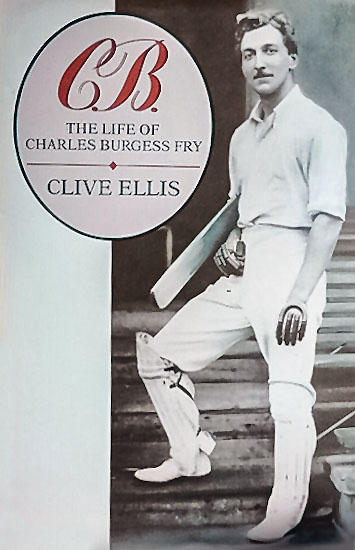
It was less than a fortnight later, on 18 December, when C.B. was chosen as the subject for This Is Your Life. It was the BBC's property at this time and presenter Eamonn Andrews selected his victim from the studio audience. Fry was accompanied by Denzil Batchelor and soon found himself on the familiar lightning trip along the dim corridors of a life-time.
They brought on William Clarry, who had been an office boy on Fry's Magazine, Eric McGavin, who was in charge of musical instruction on the Mercury, and Dame Rachel Crowdy, C.B.'s fellow-mover at the League of Nations and dancing partner. Then there was Josephine Bradley, his gifted dancing instructor and friend, and Reg Sinfield, the Mercury boy who had gone on to play cricket for England. For the grand finale the surviving members of the 1912 England side which Fry had led to victory in the Triangular series were reunited with their skipper – legendary names like Jack Hobbs, Sydney Barnes, Jack Hearne, Tiger Smith and Wilfred Rhodes – [Bigredbook.info editor: in fact Jack Hearne and Wilfred Rhodes, although mentioned in the programme's script, did not actually appear] and the fond reminiscing went on deep into the night. C.B.'s only slip was in confusing Reg Sinfield's voice with that of Jack Hobb's. 'How could I forget my chief hand', he said to Sinfield behind the scenes afterwards.
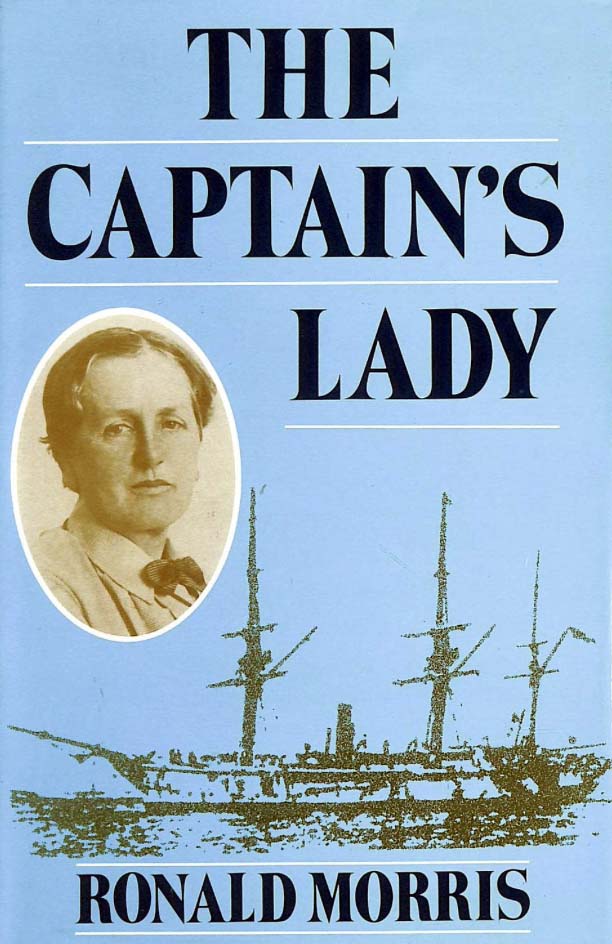
There was a brief return to the limelight in 1955 when he was guest of honour on the television programme, This Is Your Life.
The carefully staged pleasantries, the figures from the great man's past previously drilled in what to say, filled out the usual half hour of television time with the details of an astonishing career.
There seemed to be no shadows, no dark corners, to mar the impression that this had indeed been a life worth living.
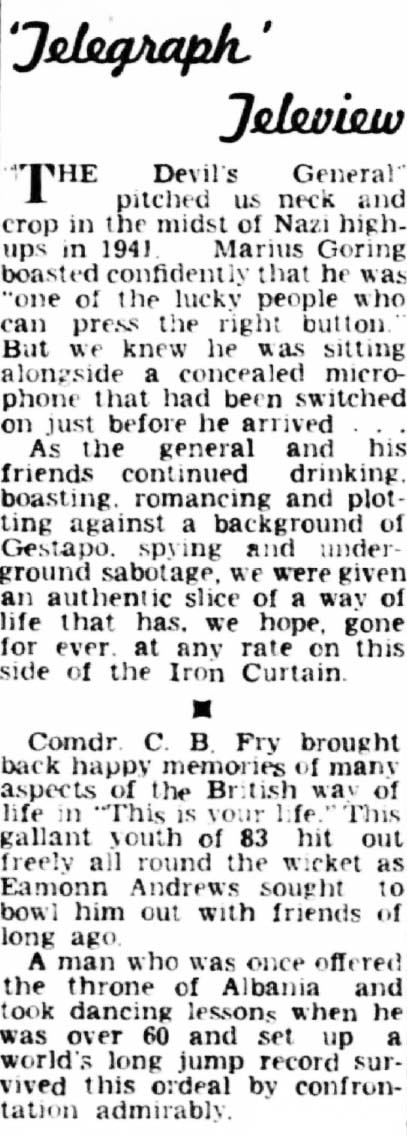
Northamptonshire Evening Telegraph 19 December 1955
Comdr C B Fry brought back happy memories of many aspects of the British way of life in This Is Your Life. This gallant youth of 83 hit out freely all round the wicket as Eamonn Andrews sought to bowl him out with friends of long ago.
A man who was once offered the throne of Albania and took dancing lessons when he was over 60 and set up a world's long jump record survived this ordeal by confrontation admirably.

Daily Herald 19 December 1955
By Andrew Smith
GERMANY's most popular post-war play, "The Devil's General," based on an episode of the war, was a towering success on BBC TV last night.
It gripped like a good thriller and yet was as poignant as a tragedy.
The hero, Luftwaffe General Harras, was modelled on Ernst Tiles, the daredevil who died mysteriously in 1941 after falling out with the Nazis, and the anti-Nazi German playwright, Carl Zuckmayer, offers a solution to the mystery. It is that Udet was shot down trying to fly out of Germany.
One flaw
Marlus Goring was the General, a man with three loves - flying, women and wine, all equally full-blooded - but with a spark of humanity too, that revolted against the Nazi philosophy.
But one flaw, about which viewers phoned the BBC, was that in places the background music drowned the dialogue. This happened also in This Is Your Life in which C. B. Fry was the "victim."

The Birmingham Mail 19 December 1955
Paying tribute to C. B. Fry is one of the things that TV (and any other public medium) ought to do, but This Is Your Life is, I am sure, not the way to do it.
This respected veteran, hauled out from the audience, spent the half-hour trying to get his bearings, with voices coming at him from one direction and people from another - and in a not very successful competition with the compere to get a word in edgeways.
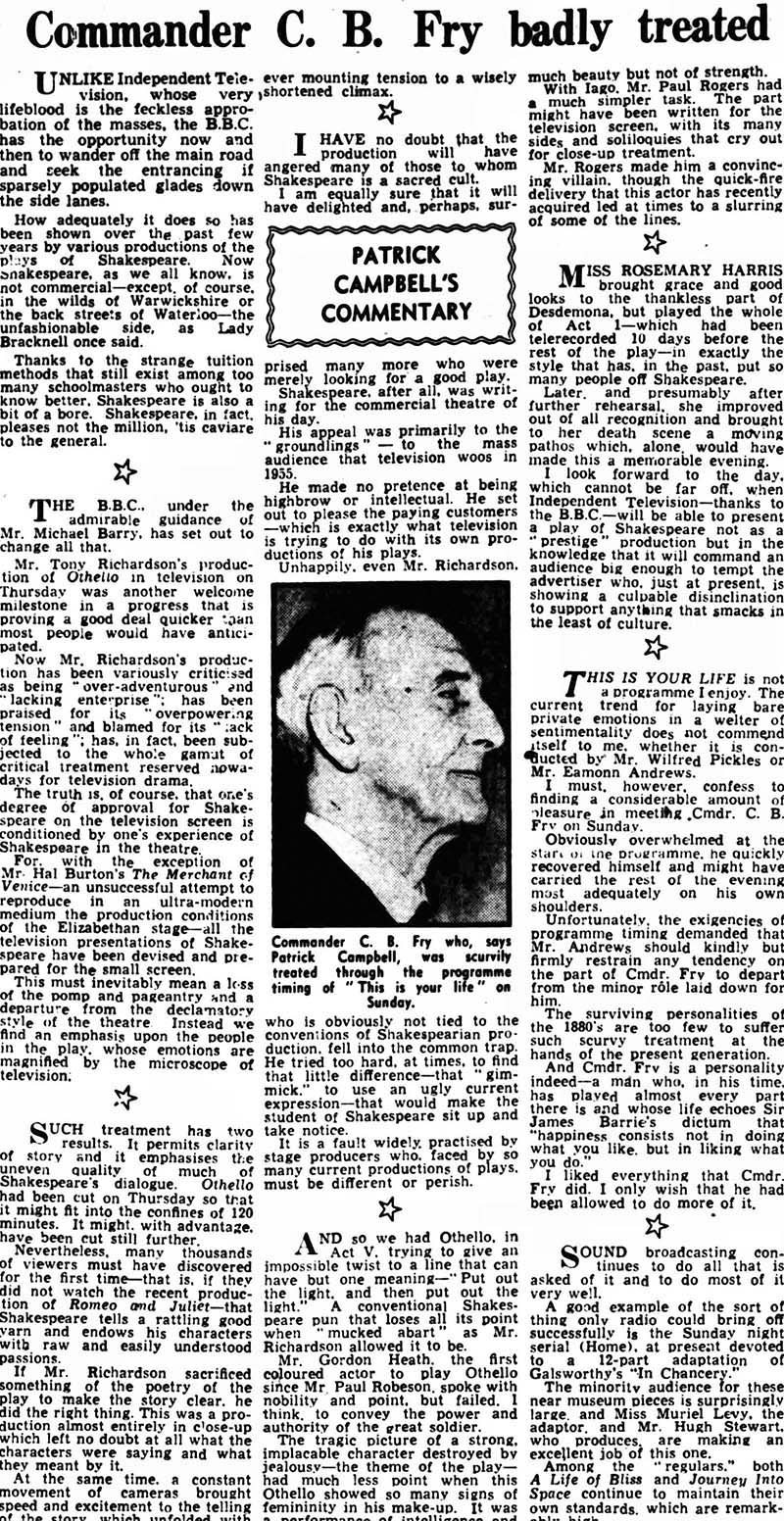
The Yorkshire Observer 21 December 1955
PATRICK CAMPBELL'S COMMENTARY
THIS IS YOUR LIFE is not a programme I enjoy. The current trend for laying bare private emotions in a welter of sentimentality does not commend itself to me, whether it is conducted by Mr Wilfred Pickles or Mr Eamonn Andrews.
I must, however, confess to finding a considerable amount of pleasure in meeting Cmdr C B Fry on Sunday.
Obviously overwhelmed at the start of the programme, he quickly recovered himself and might have carried the rest of the evening most adequately on his own shoulders.
Unfortunately, the exigencies of programme timing demanded that Mr Andrews should kindly but firmly restrain any tendency on the part of Cmdr Fry to depart from the minor role laid down for him.
The surviving personalities of the 1880's are too few to suffer such scurvy treatment at the hands of the present generation.
And Cmdr Fry is a personality indeed – a man who, in his time, has played almost every part there is and whose life echoes Sir James Barrie's dictum that "happiness consists not in doing what you like, but in liking what you do."
I liked everything that Cmdr Fry did. I only wish that he had been allowed to do more of it.
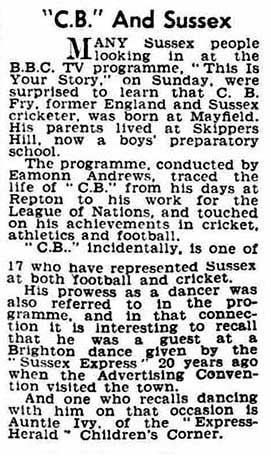
Sussex Express and County Herald 22 December 1955
Many Sussex people looking in at the BBC TV programme, This Is Your Life, on Sunday, were surprised to learn that C B Fry, former England and Sussex cricketer, was born at Mayfield. His parents lived at Skippers Hill, now a boys' preparatory school.
The programme, conducted by Eamonn Andrews, traced the life of "CB" from his days at Repton to his work for the League of Nations, and touched on his achievements in cricket, athletics and football.
"CB", incidentally, is one of 17 who have represented Sussex at both football and cricket.
His prowess as a dancer was also referred to in the programme, and in that connection it is interesting to recall that he was a guest at a Brighton dance given by the Sussex Express 20 years ago when the Advertising Convention visited the town.
And one who recalls dancing with him on that occasion is Auntie Ivy, of the Express Herald Children's Corner.
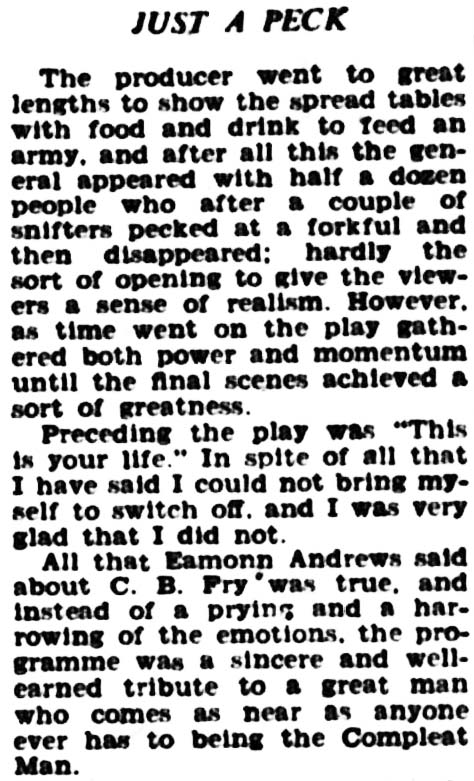
Weekly News 23 December 1955
Preceding the play was This Is Your Life. In spite of all that I said I could not bring myself to switch off, and I was very glad that I did not.
All that Eamonn Andrews said about C B Fry was true, and instead of a prying and a harrowing of the emotions, the programme was a sincere and well-earned tribute to a great man who comes as near as anyone ever has to being the Compleat Man.
Series 1 subjects
Eamonn Andrews | Yvonne Bailey | Ted Ray | James Butterworth | C B Fry | Johanna Harris | Donald Campbell | Joe BrannellyStanley Matthews | Henry Starling | Ida Cook | Lupino Lane | Hugh Oloff de Wet | Elizabeth Wilde | Robert Stanford Tuck